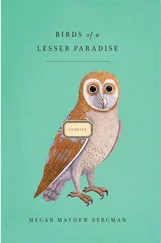Avis lowers her head, runs her fingers into the new perimeter of her hair. She tries to think her way through this: the link between death and sugar. Stanley sends her nutrition newsletters with reports on diabetes and obesity. It seems to her that sugar is a metaphysical problem: each occasion of eating asserts its own needs. Her fingers wait on the keyboard as her vision glazes out the east windows, unfocused. All the glorious pastries of the world are baked and eaten and gone forever, and there is only the fiery moment of the now . Minds and bodies tell one story: I tasted; I loved; I was young. But the now burns everything in its oven. Her mother said that heaven was “the unattainable.” The mynah’s cry tears at the air, sailing over the trees and hedges and songbirds. She thinks: Perhaps the neighbor hates me because I work with sugar.
Suddenly it simply isn’t a choice: Avis feels she must explain herself to the neighbor — it’s unbearable that the woman might think Avis a fool or insane or not “in possession” of herself.
The grass feels hard against her bare feet and she pushes through the thicket of the palms, scraping her arms, the fronds like pastry knives. The bird in its cage becomes agitated when it sees her, and Avis nearly stops, startled by its keening. The sun is up, but the woman hasn’t come out yet. She taps, then raps her knuckles against the wood-framed screen door: the back door is open. “Hello in there!”
A shape emerges behind the dark screen. “Dieu.” Pure exasperation. She tilts open the door. “You are here again?”
Avis tries to smile, her lips tremble. “I brought you…” She holds out the white bakery box.
The neighbor steps outside and gives her a long look — less caustic than before, but still full of irony. Finally she says, in that contrapuntal accent, “So I am never going to be rid of you.”
Avis touches the lid of the box. “Do you like chocolate and hazelnut? They’re petits fours. They have a little layer of marzipan and a layer of meringue. Some berry.” As long as she stays focused on the box her voice is steady. “I wanted to apologize.”
“You did, did you.”
“I wanted—” Avis turns slightly, gestures toward the trees. “I was just peeking,” she says hopelessly.
“Yes, like a spy.”
“No, no, please. The — your bird was — singing — making its sounds. And I just came to see. I work at home. I’m a baker.” The woman’s face registers nothing. Avis soldiers on. “And I came — just to look. And you looked so pretty and the bird was so sweet with you, and so…” She trails off.
The woman’s obsidian eyes are pitiless. “How many times you watch me? More than one?”
Avis clears her throat lightly.
“Spying,” the woman says matter-of-factly. “Where I come from, you know what happens to spies?”
“Nothing good, I’m sure,” Avis mumbles.
Then she seems to think of something. “You know how long it took me to polish that tray? An hour and a half. Just to get it clean.”
Avis almost says: You’re not supposed to clean it. Instead she opens the box and offers it again. “Please. If you would accept these? It’s just something small.”
Finally the woman consents to look in the box. Avis can smell the sparkling fraise des bois essence. She sees a lilt, like sadness, in the woman’s face as she touches the box. “These are marzipan petits fours?” She lowers her face, inhaling. “The lady who owned the house where my mother worked — almost every day she ate these. This style. My mother smelled like these berries. Every day, the cook made twenty petits fours.”
“That would have kept her busy!” Avis smiles carefully.
The woman gives her a cool look. “Yes. The lady ate two, the son ate four, and the husband possibly one or none. They threw the rest to the pigs. All the food in that house was so beautiful. The house was like something from heaven — much grander than these around here.” She looks up and Avis senses something conjured, shifting between them. “I learned to mistrust beautiful things.”
“Your yard is beautiful,” Avis says softly.
She looks around, both of them taking in the orchids in the trees, the fountains of greenery, creamy blooms of gardenia and emerald shrubs that seem to Avis to have sprung up in a matter of days.
“It doesn’t belong to me,” the woman says. But something in her has relented. “ You were the one who made those black cookies? With your own hands?”
Avis holds the box in her left hand and lifts her right. The woman studies it, as does Avis: the skin thickened and dry and loose as a work glove, the fingers crosshatched with fine white scars from nicks, thicker pink and red scars from varying degrees of burns, white crusts of flour along the nails and knuckles, the powerful wrist, the wiry, defined muscles of her forearm. “Not a white woman’s hands,” she says slyly. “Do your neighbors know you have hands like these?”
“I have no interest in the opinions of my neighbors.”
“In that case…” She places her hands on the bottom and closed lid of the box. “I shall accept your beautiful things. Perhaps even eat one or two.” She looks up from the corner of her eyes. “I won’t throw any to the pigs.”
She begins to move back toward the house and Avis follows, reluctant to lose her so quickly. “May I ask—”
The woman sighs, turns, mouth downturned, eyes liquid disapproval.
“What is your name?”
She lifts her black eyes. “What is yours ?”
“Avis. Avis Muir.”
“Then I am Solange.”
“Solange.” It’s not as musical when Avis says it. Her breath is high and thin: she wants to ask where she came from, if she will stay, why she is here in this neighborhood. But the woman’s face recedes into a powerful remoteness, dismissing Avis. She waits another long moment and notices a flutter of red: a cardinal quivers in the bushes against the woman’s house. Avis wants something from her. There’s a space inside of Avis like a cookie form, which seems to be the very shape of the thing she wants from this woman. Heaven is the un-haveable, her mother said. She remembers Geraldine’s soaps that looked and smelled just like caramel cakes. Avis ate one when she was very small — then, aghast, spat it out. Her mother had said, That’s what make them so delightful — you want to eat them, but you can’t .
Still, Avis refuses to believe that she only wants to want: that was her mother’s illness, not hers. She rubs her knuckles over her lips thoughtfully and finally says, “I’d like — I would hope — we can be friends.”
The woman laughs, revealing beautiful, bright teeth. “Hope all you like, but I may not feel the same.”
AT THE INTERSECTION OF BIRD AND U.S. 1, BENEATH the shadow of the Tri Rail overpass, the Dominican woman in the peaked straw hat sits on the concrete divider beside her little array of mangoes and string bags of some sort of nut or pod. She also has a carton filled with bunches of small purple flowers. Brian waves a few bucks out his window as he pulls up to the light. The regular homeless man, skin burnt beyond race, is there as well, on the other side of the street. He notices Brian’s gesture and starts to move toward him, but the woman hustles over. They make the exchange and Brian is out of there — pulling into the stream of Benzes and junkers and Hondas — before the homeless man can come close.
At the Ekers Building entrance, Brian notes the way Rufus averts his gaze from the bouquet (he feels conspicuous, with a leather briefcase in one hand and the flowers — so small they’re almost a corsage — in the other). “Hello, Rufus,” Brian says as he enters.
Читать дальше












